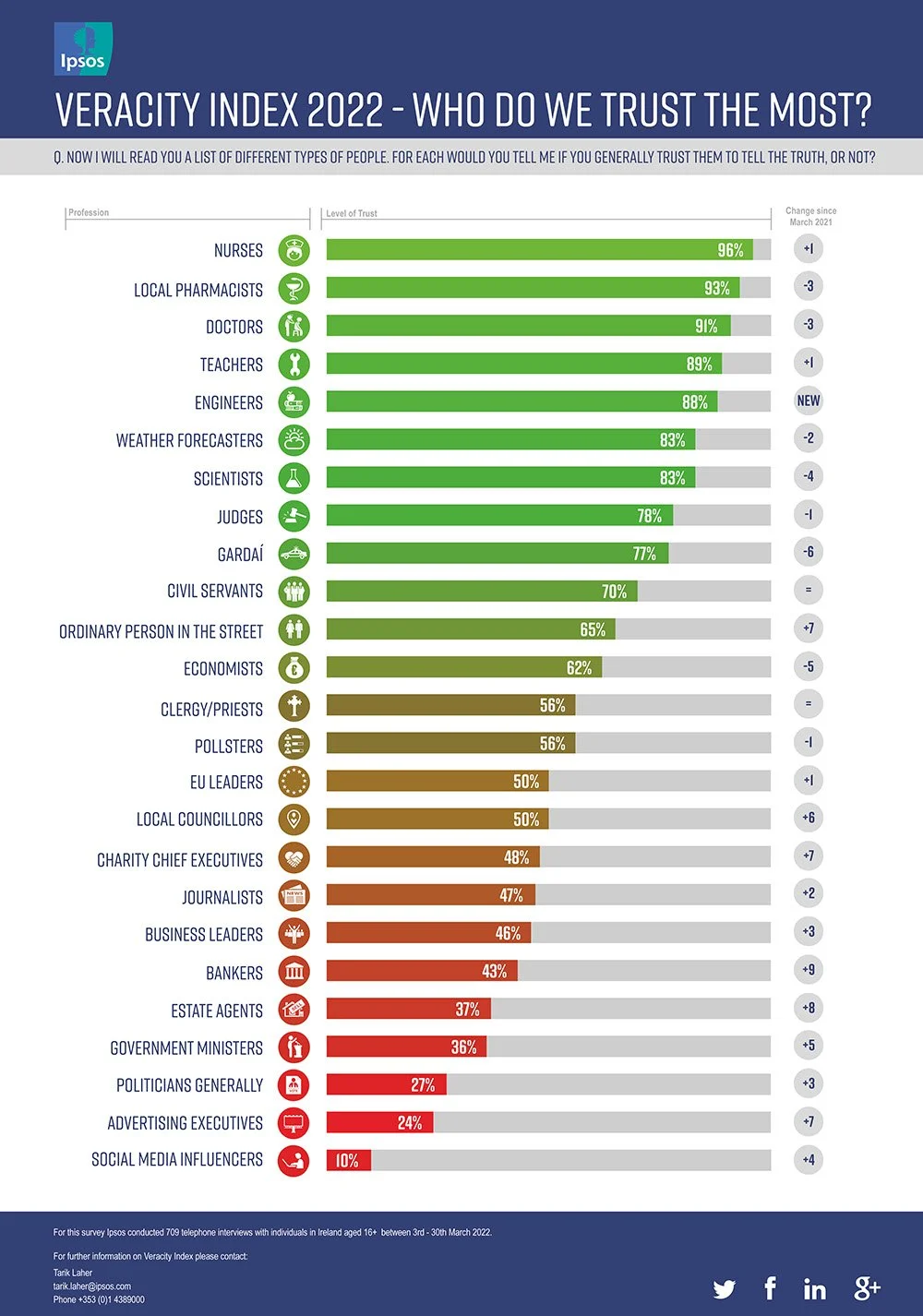ASTI Education Conference 2023
The Educational Conference of the ASTI returned post-pandemic on Saturday, in Limerick, and I attended since the focus was Curriculum for the Future: getting policy and practice right. We are right now at a significant moment: the Junior Cycle Framework has been ‘implemented’, last week the Minister for Education ‘deferred’ the plan to move English and Irish Leaving Certificate Paper 1s, and now we are facing into the big Kahuna, full Senior Cycle reform. This is part of an ongoing series of blog entries and reports to cover this moment of reform in secondary education in Ireland.
Below are some scattered notes and comments (rather than a comprehensive account of the day). They are on things I noticed / found interesting.
Keynote: Professor Damien Murchan of TCD:
In Ireland, there is a high level of trust of teachers (despite what on occasion social media and certain media commentators might say). The 2022 Ipsos Veracity Index puts teachers in Ireland at an 89% trust mark, outscored only by nurses, local pharmacists and doctors, though of course this could decline in the future.
A curriculum doesn’t naturally evolve: it needs some kind of regular impetus, which is what we are facing into now.
Dr Majella Dempsey of Maynooth University: Curriculum Change and the Teaching Profession
Curriculum is a complex area of many moving parts: the Paper 1 proposal in English and Irish would have had an impact elsewhere (including of course non-academic areas of school life, and on student well-being). For instance, Dr Dempsey’s PME students had reports of being told in some schools to start teaching Leaving Certificate material in Transition Year (this point has been made repeatedly by Conor Murphy - that a 3-year course was being created by default).
Communication is central to reform. Resistance is part of change, and indeed if there is not resistance, things do not change fruitfully.
We bring our life and professional histories to reform: the Junior Cycle reform process (I have written about that) was fraught and left scars. I believe that the Paper 1 fiasco will also be brought forward in schools to the wider reform; the Minister and the Department are less likely to be trusted due to it, and although it was a ‘relatively’ minor matter involving two subjects, the impact will have been damaging.
Teachers are at the centre of reform: no curriculum teaches itself.
We need to protect teachers’ power within their space to make their own pedagogical decisions (we can see this tension right now across the water). There was a valuable slide on ‘protection’, including ‘agency’ and ‘knowledge’, and Dr Dempsey stated importantly that ‘skills, attitudes and values can only be developed in the context of knowledge.’
Andrea Bradley, General Secretary of the Educational Institute of Scotland- Teacher Unions and Curriculum Change: Perspectives from Scotland.
This was given remotely due to the Scottish pay discussions. Much of what she said reflected what has happened or might happened here:
The prolongation of a hierarchical culture in Scottish education, with edicts handed down (see Paper 1 here for a very recent example).
The stress of reform being pushed through at ‘breakneck speed.’
Don’t just set up ‘stakeholders’ for a consultation process but actually then genuinely listen to them.
Panel discussions before and after lunch: those above plus Kieran Christie (ASTI), Dr Melanie Ní Dhuinn (Marino Institute), Dalton Tatton (Department of Education)
Professor Murchan pointed to the importance of subject associations in reform (here, pushed aside for Paper 1). Consultations usually have a low participation rate. One delegate said in her subject she realised that she was in the ‘B’ team in consultations with the NCCA, and real decisions were taken by the A team, which excluded teachers.
Kieran Christie of the ASTI again stressed the ‘red line’ of not assessing our students for state certification purposes. That is of course most contentious thing of all and it is difficult to imagine some sort of amiable settlement over it. He also mentioned the absurdity of stating that every subject should have a 60/40 division between examination and another form of assessment, as if all subjects are the same.
Questions from the floor returned to the idea of the ‘dumbing down’ of the Junior Cycle curriculum. Kieran Christie referred to the ‘plethora of unresolved problems with the JC.’ Dalton Tatton (see below) admitted there were concerns with JC.
Dalton Tatton of the Department of Education referred to the benefits of the CAO system in terms of anonymity and convenience (the American system can be pointed to as being particularly inequitable, though our very high levels of school completion bring a different access-challenge). Elsewhere, from the floor there were comments on how the CAO is the central limb of stress in the Senior Cycle, and yet it is not being addressed. The CAO is a private system being operated by the universities, and they can change it at any point.
https://www.ipsos.com/en-ie/ipsos-veracity-index-2022
